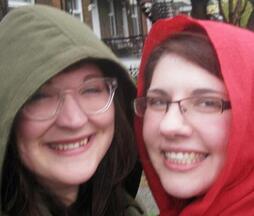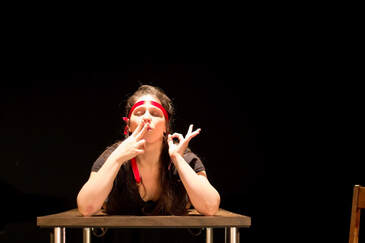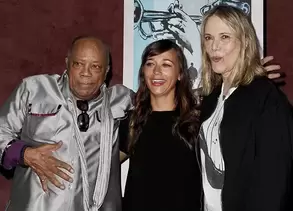 My close friend and I in 2012 - the only picture I have of me (right) wearing the head scarf in question. My close friend and I in 2012 - the only picture I have of me (right) wearing the head scarf in question. CW: Discussions of overt racism, uncensored anti-Indigenous racial slurs and "jokes", reference to Islamaphobic slurs I was living in St John’s about 12 years ago, when I had an encounter from which I have never fully recovered. I was walking in my neighbourhood a little after dark, on my way to a party a few streets away. It was winter, and the snow was falling. I had done my hair, and didn’t want it to get wet, but the style would be ruined if I wore a hat. I opted to cover my hair with a bright red scarf as a stylish and practical solution. I saw the light from the headlights on the snow first as the black truck drove up behind me. I kept walking, but as a woman alone at night, I was hyper-aware that the truck was slowing down as it approached. It slowed to a crawl as it passed me. The window was already rolled down, a white man in his 20s leaning out to get my attention. He looked right at me, took a deep breath, and at the top of his lungs he screamed: “SAND N-WORD!” Over, and over again, until the driver hit the gas, and the truck peeled away. As scared as I was standing alone in the dark after being verbally assaulted by a racist, and as angry as I was at said racist for intending to harass someone whom he believed to be of Middle Eastern descent walking alone at night, the first thing that came to my mind with any clarity was based on a joke comedian Margaret Cho once told. What I thought was: “I’m not even Middle Eastern, I’m Indigenous – if I’m anything, I’m a Squaw. If you’re going to be a racist, the least you can do is get the terminology right.” Then I immediately burst into tears and ran the rest of the way to the party. Cho’s actual joke was about being called an anti-Chinese slur as a Korean woman, but the message had always resonated with me. While this was one of the scariest times I was ever misidentified, it certainly wasn’t the first. I am a proud First Nations woman, so I have dealt with my fair share of encounters with anti-Indigenous racism – overt and covert, intentional and unintentional, screaming and civil, everyday and institutional. Nothing really surprises me anymore. Funny story: A guy at a party once found out I was Indigenous and spent twenty minutes telling me racist jokes about the reserve near his hometown. Like this one: Q - What’s red and black and blue all over? A - Rez wives. ...What can I say but “yikes"? I honestly think he thought he was flirting. I was laughing along to avoid upsetting him, just long enough for my ride to come pick me up. Upon reflection, maybe that story isn’t so much funny as it is cringey and kind of disturbing. Maybe you just had to be there. Anyway, the point is that yes, bigotry against who you are hurts, and it is something each person who experiences it must learn to navigate for themselves; but it isn’t exactly surprising that, if you belong to or identify as a member of any marginalized group, some people will always have a problem with who you are. What can be harder to navigate, and explain to others, is when people have a problem with who you aren’t. If I may? I am a person of mixed race, who has pale skin due to French, English, Irish, and Scandinavian genetics. I also have thick, dark hair, dark eyes, high cheekbones, and a pronounced nose, due to my Indigenous heritage. This makes me “ethnically ambiguous” in the eyes of many people. This term means many things but in the most basic sense it means that the combination of my inherited physical features makes it hard for people to categorize me comfortably into an ethnic or racial group without a cultural signifier to go by, like clothing or hairstyle. And I'm not alone - especially in the arts. Many celebrities share the trials (and occasional triumphs) of being ethnically ambiguous - Keanu Reeves, Angelina Jolie, Meghan Markle, Wentworth Miller, Fred Armisan, Dwayne Johnson, Rosario Dawson, Lou Diamond Phillips, Maya Randolph, Mila Kunis, Cliff Curtis and Rashida Jones, just to name a few. Each has found themselves responding to curiosity and misconceptions around their racial and ethnic identities throughout their careers. Rashida Jones, for example, was walking the red carpet for the Screen Actors Guild Awards in 2015 when she went viral for her reaction to someone's misconceptions about her skin colour. A stunning woman by any metric, Rashida looked perplexed, then annoyed, when TNT reporter Danielle Demski exclaimed: "You look like you've just come off an island or something, you're very tan, very tropical!" To which the Rashida replied, with more grace and class than I could ever hope to achieve in the same moment: "I mean, you know, I'm ethnic. It's just being ethnic. That's what it is." Demski laughed awkwardly, and probably wished she had done her homework on Jones' background - Rashida is the daughter of Jewish actor Peggy Lipton, and black music producer Quincy Jones. She has spoken many times about her experience as an ethnically ambiguous performer. As for me, I’ve spent most of my life on the island of Newfoundland, surrounded by people with whom I share at least one common ancestral heritage. Here at home, I am usually considered white-passing, as long as I’m not wearing anything that could be seen as an ethnic indicator, such as the head scarf in the above example. The true test of my otherness really begins if I’m living or traveling off-island. It becomes very clear, very quickly, that I am not quite white enough to pass a cursory inspection – and the more diverse the area, the more obvious my ambiguity becomes. For example, I am always chosen for extra screening at airport security. Every. Single. Time. I am fully acquainted with the full body scanner and pat down procedures while my carry-on is unpacked and scrutinized. And not just during international travel – it happens during domestic and inter-provincial travel, too. On a trip from Deer Lake to Goose Bay with a group of eight other people, my carry-on was the only one chosen for a drug search. Both ways. There’s also a pattern of people across my whole adult life assuming I’m Jewish. Like a cab driver in Dublin, totally unprompted, suggesting that my husband and I might like to visit the Irish-Jewish history museum during our stay, being sure to make eye contact with me in the rear-view mirror. I do think he was trying to be welcoming in a way many Newfoundlander's can understand - when your motherland is known widely for stereotypes about drinking, fighting, ignorance, and a highly imitable accent, you might want to remind visitors that there is more culture to it than just kitsch and codfish. Meanwhile, when I told a friend about the encounter, they looked confused and said, “You’re not Jewish?” I’m flattered, really – and I know the words to Hava Nagila, because that song is a jam - but I’m simply a recovering Catholic. Plus, now I have no idea how many people I’ve met who think I’m one of their Jewish friends but have never thought to confirm it outright. On other occasions I am simply labelled “vaguely ethnic.” For a while, I wrapped my hair up in a scarf to work in a commercial kitchen, because hair nets and baseball caps were not enough to keep my mane contained. Apparently, this was a dress code violation, but the manager didn’t point it out for months because they were afraid of offending me on the off chance it was a “cultural thing.” A person I met in Montreal asked what my ethnic background was at a party. When I invited them to guess what it might be, they guessed Italian, Greek, Armenian, Jordanian, Turkish, Romanian, Lebanese, Iranian, Jewish, Portuguese, and Welsh, among others, before getting around to guessing French. And we were in Montreal. Indigenous never even made the list. These are just a few of the ways I have been reminded of my otherness, and subject to people’s interpretations of it. It can be hard to understand until it happens to you, but, when someone decides that you are affiliated with a group that they don’t like, it sometimes won’t matter what the truth is - they have already decided which box to place you in, for better or worse. But what does any of this have to do with art? For one thing, the ethnically ambiguous actor can find themselves asked to play several cultural and ethnic identities over time, but rarely, if ever, their own. I, myself, have never played an expressly Indigenous character in my educational or professional career, while I have played expressly Italian, Jewish, Eastern European, Mediterranean, and Middle Eastern characters. Again, I am not alone in this. There is a long history of white and mixed race actors portraying members of racial, cultural, and ethnic groups that they are not a part of. Just a small number of examples are outlined below.
Personally, my relationship with the non-white, non-Indigenous roles I’ve played is deeply vexed and fraught with ethical and moral considerations. All this of course begs the question of whether it is ever okay for an actor to play a person of an ethnicity to which they do not belong. What if there were real efforts made to find an appropriate actor for the part, but casting agents came up empty? What if the only other option is putting a white actor in the role, instead of an actor of another racial or ethnic minority? What if you feel the story deserves to be told with or without actors who share the ethnic pedigree of the characters they have been cast to play? What if you declining the role means production will be cancelled because there are no other minority actors available? What if you haven’t worked in a year because there are no roles being offered for people of your ethnicity? What if you’re a student, and the role is tied directly to your education and could possibly influence your professional career prospects? If I were to hypothetically accept to play the part of a non-white, non-indigenous character, am I complicit in a colourist system that I abhor? As a minority, is it my duty to denounce the lack of cultural sensitivity on the part of producers and advocate on behalf of all people of color in the industry? How do you speak truth to Power when you know that there are a dozen people ready to step into your place and shut up when Power tires of being spoken to that way? It can be a complicated position to find yourself in. Like all groups, the experience and opinions of ethnically ambiguous people varies from person to person, and the conclusions I reach may not be shared by others in the same situations. I have yet to find any satisfying answers, myself, though I have learned a few things about these issues through many conversations with others in the milieu. I have learned that I have not always made the right decision, even if I was sure at the time. That I have tried to be respectful, and sometimes I have failed. That I have less power than I need and more power than I want. That I must sit in my own discomfort to truly learn from my mistakes. That I can make better, more educated choices as I move forward. I have also learned that I am as much a victim of colourism as I am complicit in the systems that uphold it, because three things have been made clear to me as a performer: 1) That I sufficiently register as the correct level of “not quite white” to be able to play characters of some ethnic groups believably. Whatever that means. 2) That I am paradoxically “just white enough” to be able to pass for your run of the mill European characters. Whatever that means. 3) That, in the grandest of ironies, I am “too white” to play Indigenous characters, despite my literal Indigeneity. So, what is an ambiguous Indigenous performer to do? In the grand scheme of things, I am just one person among many in a constant battle to reconcile how their experience fits into a larger societal narrative. I do the only things I know how to do: I try to use the privilege I have for good. I try to sincerely listen to members of groups that have been historically silenced and amplify their voices. I try to support and speak up for the equity and equality of all disenfranchised people as I advocate for my own right to thrive amidst systems designed to destroy my heritage. It isn’t always easy to talk about race, culture, or ethnicity as someone who doesn’t quite know where their voice fits into the conversation. I know there are people for whom these factors play a much bigger role in their experience; whose life is more dangerous, more segregated, made more difficult by others. I also know that I have been the target of racism, xenophobia, colourism, and bigotry, and that my experience is valid, despite the misconceptions of others. I don’t have any of the answers. At least not any that don’t involve massive social change and fundamental shifts in how the arts and culture sector operates. And that can be a lot to grapple with because, while change starts at the ground level, the people with the power to enforce that change usually work on the top floors. While I don't even have my own dressing room.  Leahdawn Helena (she/they) is a member of Qalipu First Nations, is Two-Spirit Lnu, and is the Indigenous Sociocultural Consultant at PerSIStence Theatre. She has a BFA (Theatre) and a BA (Sociocultural Studies) from MUN, Grenfell Campus. Born in Stephenville and raised in Corner Brook, she has been involved with theatre and film since her teens. She currently lives in St John’s with her husband, Chris, their cat, Montgomery, and their dog, Chevrolet Chase. Her favourite book, film, and colour are The Colour Purple.
2 Comments
 Miranda MacDonald as Woman in Offensive to Some. Miranda MacDonald as Woman in Offensive to Some. CW: descriptions of domestic abuse, violent crime, and systemic racial oppression. I love horror and true crime. I basically exist on serial killer documentaries and horror movies. I grew up on Unsolved Mysteries, The Twilight Zone and Are You Afraid of the Dark. I got my first book about the Zodiac killer when I was 11 and I now listen to true-crime podcasts to fall asleep. All this is to say that I don’t get unsettled easily. So, when I walked out of the latest production of Offensive to Some last October with what felt like rocks in my stomach, I knew I had just seen something especially disturbing and just as important. When legendary local playwright, Bernardine Ann Teraz Stapleton, penned Offensive to Some in 1995, she likely didn’t realize how relevant the piece would still be over 25 years later. Or perhaps some part of her hoped it wouldn’t be. Set in the near-present, Offensive to Some is a one-woman play that explores domestic violence, trauma, and intention, told through the character Woman, who is serving time for the murder of her abusive husband. Through Woman, we see the inner and outer turmoil which led her to commit such unthinkable actions, and the perverse strength necessary to commit them. Offensive to Some is raw, dark, wickedly funny, and visceral as all hell – which is no surprise to anyone familiar with Stapleton’s work. I swear that this isn’t just a love letter to Bernardine.  The community of Goja Haven, where Sandra Ameralik lived with her abusive partner and six children. (photo: Clevelander96, CC BY-SA 3.0, via Wikimedia Commons) The community of Goja Haven, where Sandra Ameralik lived with her abusive partner and six children. (photo: Clevelander96, CC BY-SA 3.0, via Wikimedia Commons) Stapleton was inspired by the true-to-life tale of Catherine Mandeville Snow, a Newfoundland woman found guilty in 1834 for the murder of her own abusive husband, whose body was never found. Snow was dubiously tried with little evidence, and sentenced to hang, becoming the last woman ever to be executed in Newfoundland. Stapleton was writing over 150 years after Snow’s hanging, and we are quickly approaching the 200th anniversary of the event. Women have made undeniable strides toward social equality, equitable treatment, and access to opportunity in that time. This may leave one to wonder why Snow’s history continues to inspire artists to this day, and why Offensive to Some still feel so uncomfortably relevant in 2021. Well, for one thing, the phenomenon of domestic abuse survivors killing their abusers hasn’t gone away. In fact, the week I started writing this piece, a verdict came down in the case of Sandra Ameralik. If you’re not aware of the case, Ameralik, an Inuk woman and domestic abuse survivor in Goja Haven, Nunavut, was tried on murder and manslaughter charges after killing her abusive husband in 2017. Pregnant at the time and fearing for the safety of their six children, Ameralik had stabbed her abuser once with a kitchen knife, aiming for his arm, but accidentally stabbing him in the chest. She was acquitted of all charges on the grounds of Battered Persons Syndrome – a legal defense related to long-term abuse and trauma response.  Salmon Cove, NL, where Catherine Snow lived in the 1800s, as it stands today. Salmon Cove, NL, where Catherine Snow lived in the 1800s, as it stands today. But what do Snow and Ameralik’s cases really have in common? On a surface level, aside from the charges being laid, their situations seem unrelated to one another. Ameralik admitted to killing her husband, Snow did not. Snow had a younger lover who may have had something to do with the disappearance, Ameralik did not. Ameralik was acquitted of all charges, Snow was found guilty of murder. They seem like pretty different cases, don’t they? It turns out that, while the details of their legal situations were different, the circumstances leading up to those situations were eerily similar. For instance, both women were in long-term, live-in relationships with their abusive partners, with whom they both had several children - Snow had seven, Ameralik had six. Both were pregnant at the time of the incident – Ameralik was at 29 weeks, Snow was around 24 weeks along. Both lived in rural areas with no access to a safehouse or shelter – Goja Haven has a population of just over 1000 people, Salmon Cove, even today, has a population around 600 - neither community had any services in place for survivors of domestic abuse to avail of. Both had tried to leave, fight back against, expose, or report their abuser multiple times, with no lasting or meaningful results. Locals and authorities knew about Snow’s abuse, which is why she was so quickly suspected of murder when her husband disappeared. Ameralik had called the police no less than seven times to report her abuser and had tried to take him to court multiple times. However, with no childcare options available, and threats from the abuser she was still forced to cohabitate with, she was unable to attend court dates to testify, and her abuser walked free. Both were members of marginalized ethnic groups which suffered systemic discrimination at the time of the fatal incident. It’s clear to most Canadians that Indigenous people are subject to ongoing systemic racism, both overt and covert. What is less widely known is that anti-Irish sentiments (or Hibernophobia) were a real threat to immigrants in the 1800s. Tied to anti-Catholic sentiments, the Irish were treated in ways most often associate with historic BIPOC discrimination, including racial profiling, negative stereotypes, denial of basic resources, and deadly violence, until well into the 1900s. When reading the accounts of both Snow and Ameralik (links below), it becomes clear that somehow, despite being separated by almost 200 years of alleged progress, the circumstances that allowed abuse to escalate to the point it did was essentially the same for these two women – there were simply no support systems in place that would allow them to escape or end the abuse safely. Does it make anyone else feel gross that the state of support for rural and Indigenous victims of domestic abuse in Canada in 2021 is roughly equivalent to what it was for women in 1834 colonial Newfoundland? Their abusers, despite living nearly two centuries apart, were both allowed to continue inflicting pain on their partners with little to no legal or social consequence for years, forcing their victims into unwinnable self defense situations – kill or be killed. And when those scenes inevitably played out, the victims who struck back were forced to be accountable for their actions in a way that their abusers would never be subject to. Okay, I get that all of this is a little hard to process, and none of it is pleasant. So, let me leave you with something lighter that, I think, gets to the heart of what I’ve been trying to say. There’s a weirdly dark episode of The Simpsons called “It’s a Mad, Mad, Mad, Mad Marge.” In it, the Simpsons allow a young woman to move in with them while she gets back on her feet. Marge begins to suspect that the woman is trying to kill her and steal her family. When Marge discovers her brakes have been cut, she goes to the police for help, with the following results: Marge: Look, I know I don’t have any proof, but this woman *is* trying to kill me. Wiggum: Fine, let me tell you what I tell everybody who comes in here: the law is powerless to help you. Marge: Do I have to be dead before you’ll help me? Wiggum: Well, not dead – dying. (…) How about this: just show me the knife. In your back. Not too deep, but it should be able to stand by itself. Marge leaves, understandably frustrated. After surviving multiple attempts on her life, Marge attacks the woman responsible and is arrested herself, resulting is this exchange. Marge: I thought you said the law was powerless? Wiggum: Powerless to help you, not to punish you. So… there it is, in a nutshell. Is it really any wonder that the story of Catherine Snow feels as relevant today as it was all those years ago? Or why Offensive to Some continues to be staged and received with the same urgency at it was when it premiered? Why new works inspired by the life of Catherine Snow are still being created? It’s because the story hasn’t really changed. But the way we chose to tell the story has. All we know about Catherine Snow is based on the claims that others have made about her words and actions. We know little of how Catherine really lived and saw her own life as it played out. That’s why I knew that those rocks in my stomach back in October were important. Even necessary. I believe that Stapleton helped to reforge the narrative by letting Woman tell her story in her own words – a privilege that Catherine was never afforded. And, while Woman is *technically* not real in the strictest sense, her words are the closest thing we have to the words of women who never got to tell their own story; those who were forced by flawed justice and social systems to stay and suffer at the hands of their abusers - those who never made it out alive. And the sad truth is that all we can do is keep telling and re-telling these stories – a little louder each time, for the people in the back - until those who have the actual power to shift the dynamics of the system are disturbed enough to recognize the rocks in their stomach, and finally change the narrative. ~ Bernardine Stapleton's play OFFENSIVE TO SOME premieres March 3, 2021 via broadcast on BroadwayWorld and is also available On Demand March 4-10. Learn more here. ~ Links R. v. Ameralik - Judge's Final Comments CBC News - Ameralik Acquitted Persistence Theatre - Offensive to Some Heritage NL - Women and the Court House Archival Moments - A Re-examination of the Case of Catherine Snow  Leahdawn Helena (she/they) is a member of Qalipu First Nations, is Two-Spirit Lnu, and is the Indigenous Sociocultural Consultant at PerSIStence Theatre. She has a BFA (Theatre) and a BA (Sociocultural Studies) from MUN, Grenfell Campus. Born in Stephenville and raised in Corner Brook, she has been involved with theatre and film since her teens. She currently lives in St John’s with her husband, Chris, their cat, Montgomery, and their dog, Chevrolet Chase. Her favourite book, film, and colour are The Colour Purple.  Yesterday, thestar.com reported on announcements from two prominent Canadian theatre companies that said they would be featuring female actors in lead Shakespearean roles - Why Not Theatre will have Christine Horne as Hamlet and Canadian Stage will have Diana D'Aquila will play King Lear in High Park. (See To she or not to she: Toronto stage productions reimagine Shakespeare.) I've been thinking about the role of women and the roles FOR women in Shakespeare for many years. When I was the artistic director of the Shakespeare by the Sea Festival, we would see so many exceptional women audition each season - and frustratingly were faced with limited opportunities for female-assigned roles as Shakespeare wrote them. According to a blog post from the Oxford University Press entitled Five astonishing facts about women in Shakespeare, there are seven times as many roles for men as there are for women in Shakespeare’s plays. Of the total 981 characters, 826 are men while only 155 are women; that means that women account for less than 16% of all Shakespearean characters. So each year I would try and gender-flip a role or two - Benvolio became Benvolia in 96's R & J, a female Flute in 98's Midsummer didn't ruffle any feathers, but it really wasn't until a decade later that I had "the balls" to produce an all-female Shakespeare production. 2008's Much Ado About Nothing was like nothing I had ever taken on before. Instead of gender-flipping roles, we asked the actors to embody the gender of the assigned role - and, "oh boy," did they ever! I have never seen such immersive work as these women undertook to truly embody their male characters. Voice, makeup, gesture, and head-to-toe body work enthusiastically consumed the players - they even organized a penis-making party on an off-night to experiment to find the right weight and feel for their adopted appendages! The show was a great success. Thanks to the pains that the actors took to truly become the male royalty, soldiers, lovers and comedians of the play, I like to think that the audiences quickly moved beyond "the gimmick" and reveled in the story purely on its own merits. It was truly a privilege to be a part of. The success of that experience gave me more confidence to continue with more diverse gender casting moving forward - but it still didn't feel completely "right." Women playing male characters still produced stories led in the male "voice". What would happen if the story itself was told in a female voice? Would it still stand up? So when brainstorming the guidelines for Persistence over the last couple of months, I knew that I wanted the company to be able to take on the (re)telling of Shakespeare's stories as part of its mandate. The persistent huddle challenged me: "Jenn, we can't just do Shakespeare because you want to - how to you envision justifying it within a feminist company?" "Because Shakespeare is universal," I exclaimed. "Because, because, we just HAVE to!" Well, we managed to wring a truth out of my ramblings after all. The applicable guideline that we came up with is:
So in some circumstances, that will mean we produce a Shakespeare production. My first plan to to present a gender flipped Julius/Julia Caesar in the spring of 2018 - I have thought for many years that the power dynamics of that play will place itself well in a matriarchal environment. But this guideline also gives Persistence the ability to look at the entirety of theatrical work and examine which stories hold up told in a female voice. Glengarry Glen Ross? Twelve Angry (Wo)men? Waiting for Godot? Who knows? It's a brave new world, and I'm excited to be a part of it. As we grappled with how to put this company together over the last couple of months, our huddle debated which meaning of feminism and the kind of feminism that would define this endeavour.
What we were in total agreement of, however, what that a key element would be to proudly and overtly wear the term FEMINIST has the core of our brand. Here's one article by Marcie Bianco (https://twitter.com/marciebianco) that has a lot of resonance - we recommend you read the whole thing - and in particular this: "To appropriate Simone de Beauvoir, one is not born, but rather becomes, a feminist. It is a deliberate political undertaking. It is an ethics of daily living, of fighting for gender equality under the law, of fighting for women’s agency and autonomy, of fighting for political power and representation for women. To be a feminist is to fight structural inequality and upend the patriarchal power structure. In this regard, it is inherently discomforting. " Read more: https://qz.com/692535/we-sold-feminism-to-the-masses-and-now-it-means-nothing/ International Women's Day is on March 8th and YWCA St. John's invites you to celebrate a woman or girl who has made a difference in your life!
By donating $25 to YWCA, your honouree will be listed in a sponsored ad on social media and on YWCA's website on International Women's Day. Each donation will help fund YWCA programs and services for women, girls, and their families. All donations and honouree names must be submitted by Monday, March 6th, 2017. For more information, please visit www.honourherstjohns.ca or call 902-423-6162 ext 2225. Click below to donate today! https://www.canadahelps.org/en/charities/ywca-halifax/honour-her-in-st-johns-international-womens-day/ |
AuthorPersistent Folks Archives
March 2021
Categories |
Land Acknowledgement
We respectfully acknowledge the land on which we gather as the ancestral homelands of the Beothuk [bee-oth-uck], whose culture has been lost forever and can never be recovered. We also acknowledge the island of Ktaqmkuk [uk-dah-hum-gook] (Newfoundland) as the unceded, traditional territory of the Beothuk and the Mi'kmaq [mee-gum-maq]. And we acknowledge Labrador as the traditional and ancestral homelands of the Innu [in-new] of Nitassinan [ne-tass-eh-nen], the Inuit [in-new-eet] of Nunatsiavut [nu-nat-see-ah-vut], and the Inuit of NunatuKavut [nu-nah-tuhk-ah-vut]. We recognize all First Peoples who were here before us, those who live with us now, and the seven generations to come. As First Peoples have done since time immemorial, we strive to be responsible stewards of the land and to respect the cultures, ceremonies, and traditions of all who call it home. As we open our hearts and minds to the past, we commit ourselves to working in a spirit of truth and reconciliation to make a better future for all.
Our humble thanks to First Light for sharing this land acknowledgement within our community and providing valued guidance to many organizations such as ours. You can learn more by visiting their website at firstlightnl.ca.
We respectfully acknowledge the land on which we gather as the ancestral homelands of the Beothuk [bee-oth-uck], whose culture has been lost forever and can never be recovered. We also acknowledge the island of Ktaqmkuk [uk-dah-hum-gook] (Newfoundland) as the unceded, traditional territory of the Beothuk and the Mi'kmaq [mee-gum-maq]. And we acknowledge Labrador as the traditional and ancestral homelands of the Innu [in-new] of Nitassinan [ne-tass-eh-nen], the Inuit [in-new-eet] of Nunatsiavut [nu-nat-see-ah-vut], and the Inuit of NunatuKavut [nu-nah-tuhk-ah-vut]. We recognize all First Peoples who were here before us, those who live with us now, and the seven generations to come. As First Peoples have done since time immemorial, we strive to be responsible stewards of the land and to respect the cultures, ceremonies, and traditions of all who call it home. As we open our hearts and minds to the past, we commit ourselves to working in a spirit of truth and reconciliation to make a better future for all.
Our humble thanks to First Light for sharing this land acknowledgement within our community and providing valued guidance to many organizations such as ours. You can learn more by visiting their website at firstlightnl.ca.










 RSS Feed
RSS Feed






